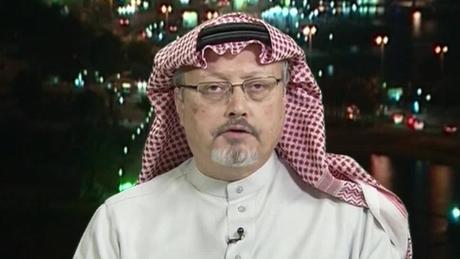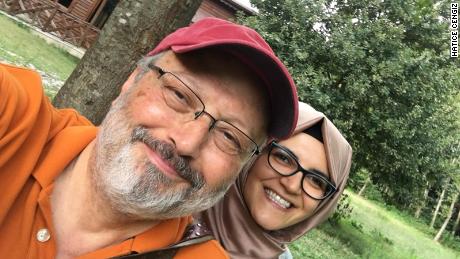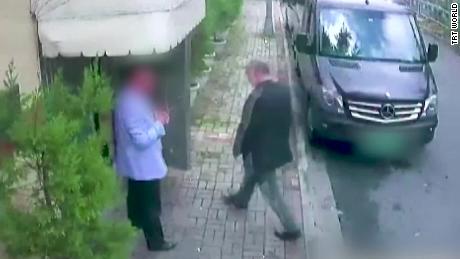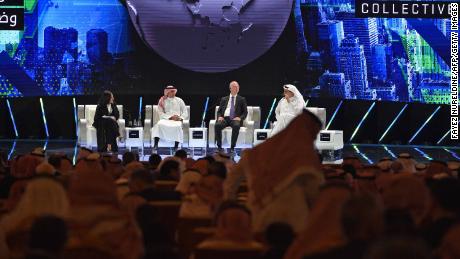Riyadh, Saudi Arabia (CNN Business)Saudi Arabia's investment conference opened on Tuesday with a dearth of big name speakers and a fleeting appearance by its sponsor, Crown Prince Mohammed bin Salman.
Dozens of top business leaders from around the world had pulled out of the Future Investment Initiative as questions mounted over the Saudi government's role in the killing of journalist Jamal Khashoggi, who disappeared after entering the Saudi consulate in Istanbul.
Speaking to CNN Business at the conference, the head of Saudi oil company Aramco, Amin Nasser, said "everyone here feels sorry" about Khashoggi's death but the kingdom was pushing ahead with its investment plans. He said $50 billion worth of deals were signed on the first day of the event, which runs through Thursday.
"We feel sorry for his family and what happened, but at the end of day you know, we need to move beyond that," Nasser told CNN Business' Emerging Markets Editor John Defterios.
"A lot of our partners are here. The ones we are doing business with are here," Nasser said.
Still, the exodus of top executives ŌĆö including the CEOs of JPMorgan Chase (JPM), Uber and Siemens (SIEGY) ŌĆö has taken the shine off the showcase event hosted by bin Salman, who has been trying to modernize the country's oil-dependent economy.
The prince, who has poured Saudi money into tech companies around the world and hung out with Silicon Valley's biggest names, is now grappling with the international outcry over what happened to Khashoggi.
Members of bin Salman's inner circle have been blamed for the Washington Post columnist's death. The Saudi government, which had initially claimed Khashoggi left the consulate alive, has since admitted he was killed inside the building but insisted it was a "tremendous mistake" and the result of a "fistfight."
That explanation has drawn skepticism, including from US President Donald Trump who said Monday he was "not satisfied" with what he'd heard.
The prince arrived at the conference in the late afternoon and spent about 15 minutes listening to a session about Formula E motor racing, which is coming to Saudi Arabia in December.
Last year, bin Salman participated in a panel discussion about the futuristic NEOM city ŌĆö a flagship project in his Vision 2030 program of modernization. On Tuesday, he didn't speak and his star guest of 2017 ŌĆö global tech investor Masayoshi Son of SoftBank (SFTBF) ŌĆö was nowhere to be seen.
Total in, Siemens out
Organizers of the Riyadh conference, widely known as "Davos in the desert," had hoped it would be business as usual despite the loss of so many top names, including US Treasury Secretary Steven Mnuchin, the CEOs of HSBC (HSBC) and Blackrock (BLK), and International Monetary Fund chief Christine Lagarde.
Heads of state from Pakistan, Senegal, and Gabon as well as Arab states were at the event, plus a delegation of Russian entrepreneurs, executives and officials.
"We have a big delegation from Russia and our friends from China are also here. Everybody is very excited about Saudi," said Kirill Dmitriev, chief executive of The Russian Direct Investment Fund, a sovereign wealth fund.
One of the highest profile CEOs still attending was Patrick Pouyann├®, the chief of French oil company Total (TOT).
"Why wouldn't I be here. We are business partners and we support the Saudi people," he told CNN Business at the conference.
"I am convinced that an 'empty chairs at the table' strategy serves no useful purpose, especially when it comes to respect for human rights," Pouyann├® said earlier in a statement.
His comments contrasted with those of Siemens CEO Joe Kaeser, who explained in a LinkedIn post why he eventually decided to pull out of the conference.
"As soon as I heard of his death, it was clear to me that we couldn't simply move on and do business as usual," he wrote. "We in Germany should know from our history what it can lead to if people stay out of trouble and don't speak up till it is too late."
Deals worth $50 billion
The lack of big names didn't stop the Saudis doing business at the conference. Aramco said it alone signed memorandums of understanding worth $34 billion with companies from around the world including Halliburton (HAL), Baker Hughes (BHGE), Schlumberger (SLB), Total, and Sumitomo (SSUMF).
Deals worth another $16 billion were done in other sectors of the economy, Aramco CEO Nasser said.
Companies such as JPMorgan and HSBC sent less senior executives, despite their CEOs withdrawing. The head of Morgan Stanley's (MS) international business, Franck Petitgas, was also listed as a speaker.
American and European businesses want to keep channels of communication open amid the outcry over Khashoggi's killing.
Some of them have pointed to ties to the Saudi government dating back decades and their large numbers of employees in the kingdom.
Business links to Saudi Arabia are particularly strong among companies in the energy and weapons industries. The CEO of defense contractor Raytheon (RTN), Thomas Kennedy, is still listed as a speaker at the event.
























